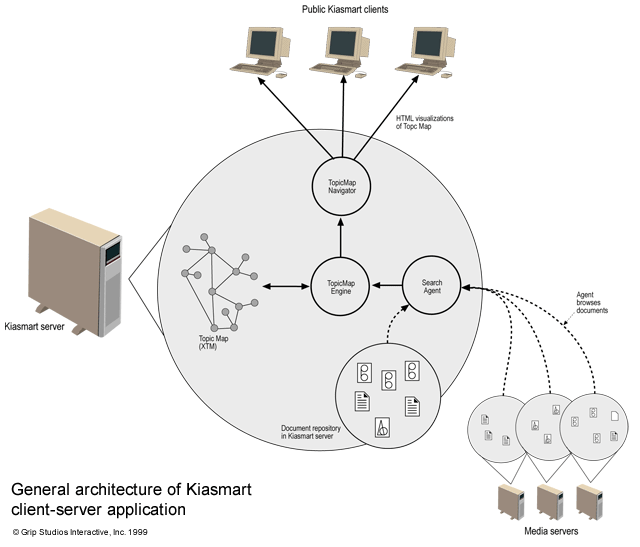Real-life projects
(→Mediateekki & Media Archive) |
|||
| Line 8: | Line 8: | ||
* Assembly Media Gallery 2005 | * Assembly Media Gallery 2005 | ||
| − | Lets examine | + | Lets examine these projects more detailed. |
Revision as of 18:40, 13 April 2007
First real-life application of Wandora, built early 2000, was virtual art gallery Kiasmart consisting of digital art images, videos and text information snippets. Since then Wandora has been applied and developed in many real-life projects.
- Kiasmart
- Arppeanet
- Mediateekki & Media Archive of Kiasma
- Assembly Media Gallery 2004
- Town and Again, Images of Urban Finland
- Assembly Media Gallery 2005
Lets examine these projects more detailed.
Contents |
Kiasmart
Kiasmart was first Wandora application project started 1999 and finished 2001. Kiasmart's motivation was to promote art collections of Museum of Contemporary Art Kiasma. Kiasmart was a client-server application where server built topic map daily using Kiasma's internal databases and image repository. Perhaps the most interesting feature of Kiasmart was this process of building topic map dynamically using metadata in images.
Arppeanet
Arppeanet was our second Wandora project started 2001 and finished 2003. Arppeanet was a client-server application used to exhibit
- A register of Helsinki University officials from 1700 century to early 1900 century.
- Moderate image collection of Helsinki University museum.
- Contemporary study options and study fields of Helsinki University.
Arppenet's application framework was developed during the project. For example Grip Studios Interactive's crossplatform framework PIP/GAF was integrated to Wandora. Integration enabled the service to produce more general representations of the topic map although the service still produced only HTML visualizations. The feature was never really taken into use.
Perhaps the most interesting feature learnt in this project was efficient extractions from loosely structured text fragments of Helsinki University official registry data using series of regular expressions. Here is an example of single registry record.
AEJMELÆUS Sanfrid August, yliop. asiamies. * Paltamo 4.2.1845 † Helsinki 13.7.1918, vanht khra Karl Aejmelæus ja Maria Karolina Thodén. Yo (pohj.) Vaasan luk. 66. Kamt 70, Tuomt 71. VT 75. - Senaatin tal.os. ylim. kopisti 70. Valtionrautateiden rataos. kanslisti 76-85. Sen. yleisen kanslian kopisti 76, kanslisti 81, kirkollistoimitusk. protokollasiht. 88, esitttelijäsiht. 06-09. - Yliop. vt. asiamies 87-89, asiamies 89-18. - Pikakirjoittajayhd. kassanhoit. 82-92. Helsingin suom. säästöpankin hall. va asiamies sen perust. 01. - St 3 93, A 3 97. - Tehnyt lahjoituksia Paltamon kunnalle ja Suomal. Kirj. Seuralle. - Puoliso 1888 Alma Johanna Emeleus, s. 1854, k. 1891, vanht khra Nils Gustaf Emeleus ja Hilda Augusta Wilhelmina Möller.
And extracted topic map can be found here. The topic map contains also all topic types and roles. The base name langugage of the topic map is Finnish.
Mediateekki & Media Archive
Mediatekki and Media Archive are WWW sites to promote video art collections of Contemporary Art Museum Kiasma. Media Archive is targeted for internal and research use. Mediateekki is targeted for larger audience and has much limited video base than the Media Archive.
The publishing pattern of Mediateekki and Media Archve are very similar to Kiasmart system described above. The data already exists in FileMaker database and is converted frequently to a topic map, and finally published using Piccolo-Wandora combination. The system generates new topic map daily and is always up to date. Here the technological issue was how to generate a topic map from FileMaker database. We tried JDBC bridge first but the FileMaker driver didn't work with poorly structured database without rigid database keys. We had to think something else. Finally we solved the data transfer problem with HTML table dumps. It may sound little awkward but the solution worked very well. The idea was that FileMaker exports four large HTML files containing each one database table every day. These HTML files are then fetched by the Media Archive and converted to a topic map. This Media Archive topic map was then filtered resulting smaller topic map for Mediateekki. And finally both topic maps were placed to a Wandora-Piccolo web application that generated HTML visualisations using the topic map and predefined HTML template files.
Town and Again, Images of Urban Finland
Town and Again was a watershed project for Wandora. Before the project Wandora was mainly a server application. Topic map was always constructed somehow with the server application and the user had limited or no chance to edit it later. Town and Again project required a decent editing options as most of the data was entered to the system during the project. This requirement started the development of Wandora's editing options and eventually the standalone application. Nowadays (early 2007) the standalone software is developed actively while the server component, namely Piccolo has minor but still important role in Wandora development. The decision for a standalone application was not evident when the Town and Again project started. Actually we developed a web application first. The web application was used with a standard WWW browser and was implemented with web 2.0 techniques, mainly Javascript and XML. During the first user tests we realized that transferring large amounts of data between WWW browser and server application was just too slow and hairy task. Editing failed just too easily if you happened to press a link while the javascript engine or server was busy. After these experiences the focus was rapidly changed to a more stable and reliable technology, Java, and Wandora standalone application was born.
The project Town and Again started 2003 and finished 2005.
Town and Again is available in internet [1].
Assembly Media Gallery 2004-2005
Best introduction to these project is
Kivelä A., Lyytinen O.: Topic Map Aided Publishing – A Case Study of Assembly Media Archive. Web Intelligence. STeP 2004 - The 11th Finnish Artificial Intellicence Conference Proceedings - Vol. 2, 2004.

